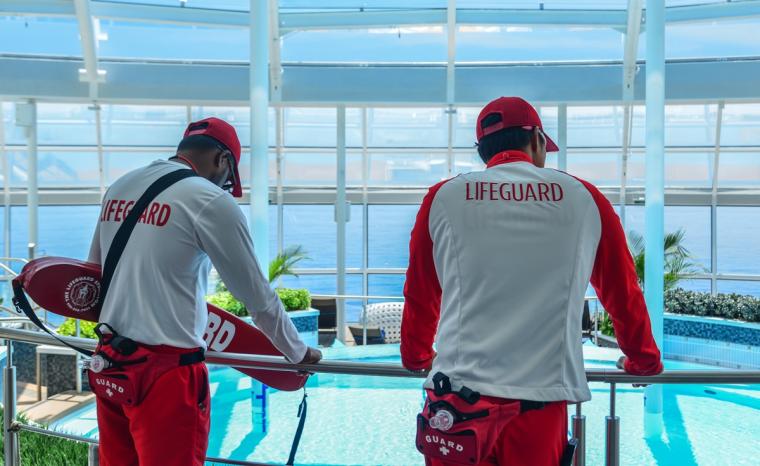
After three straight years of lifeguard shortages, cities are getting downright creative to keep their aquatic facilities open and their programs afloat. And while most people are focusing on the holidays, efforts are underway now to recruit and keep lifeguards. Here is a roundup of what’s happening nationwide.
In Hawai’i (yes, there is a lifeguard shortage there, too), Mayor Rick Blangiardi has approved $1.3 million dollars to be put toward the hiring of more Oahu lifeguards.
According to KITV Island Television, the release of funds comes as the destination prepares for the winter surf season, which brings higher surf and often more hazardous conditions, while also bring more beachgoers to west and north-facing shores.
Recruitment started this month, with a second tryout in January for a second class that starts in May 2024. Classes are six weeks long and include EMR training, jet ski rescue orientation, emergency vehicle driving, near-shore rescue training, and practical skills in saving conscious and unconscious patients from the shoreline.
Another wildly successful program in the Hawaiian islands has been its Junior Lifeguard Program, which teaches keiki (kids) ages 11-17 lifesaving techniques and ocean awareness. The program started in Oahu in April of last year.
“We’ve talked with many other lifeguarding organizations around the state, and on the continent, and have crafted a program that touches upon many of the same aspects that similar programs across the U.S. teach. Our program is unique, of course, to some of the more popular beach parks around our island and we look forward to the positive energy, and to see our lifeguards share their knowledge and experience with future generations of waterwomen and watermen,” said Honolulu Ocean Safety Chief John Titchen.
Bonus round: The program is free to all those who wanted to sign up.
But Hawai’i is not the only one using creative solutions to tackle the ongoing shortage of water safety personnel. In Charlotte, North Carolina, those who successfully participate in adult swim lessons are encouraged to move on and take lifesaving coursework.
 WFAE 90.7 Radio covered the effort, noting that it is not only a strike against the lifeguard shortage, it is a means of tackling the race inequity that has long existed when it comes to swimming skills.
WFAE 90.7 Radio covered the effort, noting that it is not only a strike against the lifeguard shortage, it is a means of tackling the race inequity that has long existed when it comes to swimming skills.
Evolutionary Aquatics is a primarily Black club that teaches adults how to swim. The radio station interviewed Brandon King, one man who often felt left out during vacations that included beach or pool time. At the age of 39, he learned to swim and from there, graduated to the lifesaving program.
King noted that he had decided to enroll in lifesaving after being unable to practice swimming when the pool was closed because of a lack of lifeguards.
The shortage contributed to the YMCA of Greater Charlotte shortening its pool hours, according to Ame Guy, association director of Aquatics for the YMCA of Greater Charlotte, which has 33 pools across five counties.
“This summer and currently, we are just now getting back to space where our pools are open from 6 a.m. until 8 p.m. without having to be closed from 12 to 4,” Guy said. “And I can’t even say that is the case for all 33 of our pools.”
Canada is another place where adults are seen as a target market for lifeguard recruitment, said CTV.
“Sometimes they're people who are now retired and used to lifeguard when they were younger,” Christine Pelletier, director of aquatics, fitness and health at Dovercourt Recreation Centre in Ottawa, said. "Or (they're) people who are master swimmers who already have the swimming ability and maybe are looking to try something new, a new challenge to become a lifeguard for the first time in their lives."
There have been certified lifeguards in Canada who are around 80 years old, according to Stephanie Bakalar, spokesperson for the Lifesaving Society Ontario.
"There's a minimum age, but there's no maximum age," she said. "As long as you can meet all of those criteria and you're physically able and you have the right judgment and skill, you can lifeguard and every two years you're going to recertify and re-demonstrate those skills."
In North Carolina, the program also challenges racial stereotypes but the common picture of lifeguards as teenagers or college students working a summer job. Sixty-seven-year-old Michelle Jennings Bruton has progressed through Evolutionary Aquatics’ different levels.
“It's definitely helping me health-wise; it's helping me stay fit, which is what I definitely need. It's helping me to keep my body moving,” Bruton told reporters. “I didn't want to be one of those people who retired and just lay on the couch all day; that's not me. I wanted to find something to do, and I realized this is what I really like to do; this is a passion for me.”
Another age-related tactic used last year in Canada by the Ontario government was lowering the minimum age requirement for lifeguards from 16 to 15 years. Pelletier said they had already hired 15-year-olds who had completed their certification and gave them jobs as assistant instructors until they turned 16.
Many destinations also have removed all fees associated with training programs in order to encourage interest.

